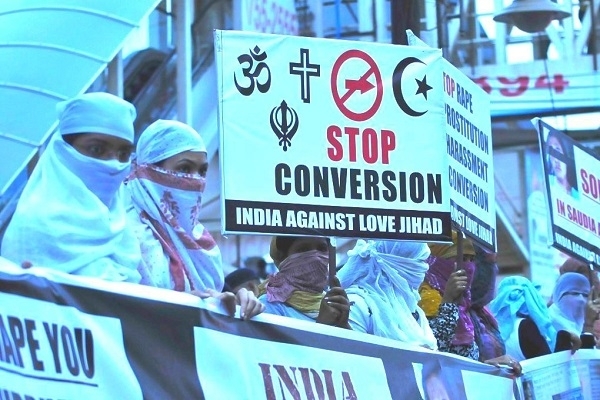What Critics Of Anti-Conversion Laws Overlook
Total Views |
The critics who, in the name of individual liberty and equality of women, are calling this law an 'uncivil proposal', are turning a blind eye to innumerable cases being reported where romantic relationships are being used as bait for changing religious identity, largely of non-Muslim women.
In the name of gender rights, many are critical of the decision taken by the state of Uttar Pradesh which has announced a new law to protect the freedom of religion, with special emphasis on protecting women from conversion which happens in the guise of love and marriage. The ordinance, called Uttar Pradesh Prohibition of Unlawful Conversion of Religion 2020, has been targeted as negating the rights of women and serving as an instrument of controlling them and their choices. But there have been many pertinent socio-cultural challenges in our society that have been brushed under the carpet for decades. This includes not only religious conversions that have been imposed on women and, at times, minor girls in interfaith relationships and marriages, but also those who have been hoodwinked by their spouses into legitimizing polygamous relationships.

The critics who, in the name of individual liberty and equality of women, are calling this law an 'uncivil proposal', are turning a blind eye to innumerable cases being reported where romantic relationships are being used as bait for changing religious identity, largely of non-Muslim women. The majority of such cases do not find space in national dailies and even if they do, it will be a small corner in the inner pages. One such case which was reported in the mainstream media was of national shooter Tara Shahdeo who had charged Raqibul Hassan, alias Ranjit Kohli, for allegedly giving false information about his religion at the time of their wedding. Many minors who are gullible and unaware are either abducted or fraudulently engaged in relationships and are later threatened or blackmailed. The National Commission for Protection of Child Rights (NCPCR) has been addressing many such complaints. One such case was of a 14-year-old Hindu girl from Madhubani, Bihar who was abducted by an adult Muslim from her village in the month of August. Suo moto cognizance by the NCPCR swung the local police in action and resulted in the rescue of the minor from Gujarat. In 2019, a 17-year-old girl went missing from Ghatkopar area of Mumbai. On her mother's complaint, the NCPCR put forward an inquiry to Mumbai Police which rescued her and arrested the accused Akhter Sheikh after her medical examination.
The present political dispensation is being held responsible by some for polarising society who perceive this law as anti-Muslim. The first state to introduce the Freedom of Religion Act to arrest forceful, dubious conversions was Odisha in 1967 followed by Madhya Pradesh, which enacted Dharma Swatantrya Adhiniyam in 1968; both were governed by Indian National Congress at that time. Also, it was the Congress-governed state of Madhya Pradesh that constituted a committee under the retired Chief Justice of Nagpur, Bhawani Shankar Niyogi, to report on religious conversions that were not 'completely voluntary'. The recommendations of the said committee, published in 1956, were instrumental in enacting the Freedom of Religion Act. In Himachal Pradesh, the Freedom of Religion Act was first brought in 2006 by the Congress government and amended in 2019 by the BJP government by increasing the punishment to up to five years in case of religious conversion by use of misinterpretation, force, coercion, inducement or by marriage; this was passed unanimously by the state assembly.
It was in 2009 when Justice KT Sankaran of the Kerala High Court, while dismissing an anticipatory bail application, found indications of forceful religious conversions under the garb of love, and asked the government to enact a law to curb it. However, besides Uttar Pradesh, there are other states like Odisha, Madhya Pradesh, Chhattisgarh, Gujarat, Uttarakhand which already have a law against forced religious conversions. In Uttarakhand, it was the High Court which, while hearing a petition where religious conversion had preceded a marriage, said that such conversions are a sham and suggested to the state government in 2017 that it should bring a law for the same in the fast-changing social milieu.

Some have approached the Allahabad High Court against the Uttar Pradesh anti-conversion ordinance. This is not the first time that an anti-conversion law has been challenged in the courts. In 1977, Reverend Stanislaus challenged the Madhya Pradesh Dharma Swatantrya Adhiniyam, 1968, and the Orissa Freedom of Religion Act, 1967, in the Supreme Court. The court held that the right to freely profess, practise and propagate religion as laid down in Article 25 of the constitution does not include the right to convert, and upheld the constitutional validity of both the state laws prohibiting conversion by force, fraud or allurement.
On the other hand, there are situations where non-Muslim men have been exploiting the route of religious conversion for defying their personal laws to indulge in polygamy. A well-reported case was of the former Deputy Chief Minister of Haryana, Chander Mohan, who became Chand Mohammad to wed for a second time. The Law Commission of India had in 2009 submitted a report on 'Preventing Bigamy via Conversion to Islam' highlighting a proposal for giving statutory effect to various Supreme Court rulings. In one case, advocate Lily Thomas approached the Supreme Court on a non-Muslim man who had converted to Islam to indulge in bigamy. The court ruled that change of religion does not dissolve the marriage performed under the Hindu Marriage Act between two Hindus and the second marriage will be treated as an offence. The top court also said that the renunciation of religion by the man while in a marriage is a ground for divorce.
The judiciary has always been protective in its decisions on the rights of women. But the law will empower them to exercise their fundamental rights, as laid out in our constitution.
Also, laws which give equal marital rights to women of all communities, sects, and faith will help them defeat exploitation through conversion. A gendered approach is important in framing laws to strengthen the independence of women, to insulate them from blackmailing, coercion and intimidation that has been the reported ploy in religious conversions commonly known as 'Love Jihad'. Let the posturing of secularism not hinder strengthening women and minor girls in exercising their personal liberty to pray.


